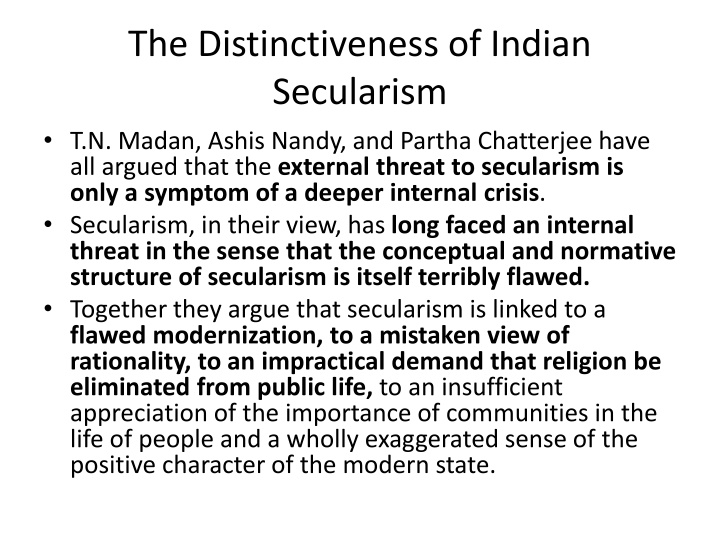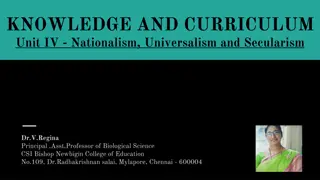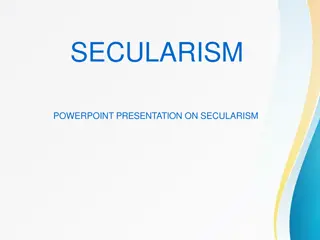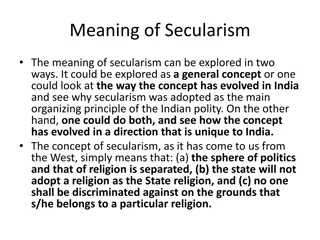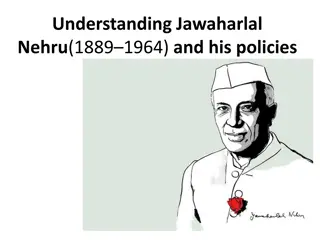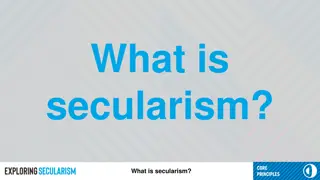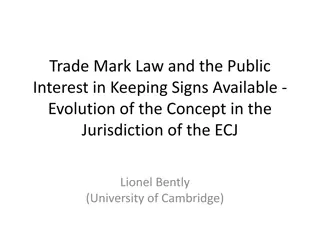The Distinctiveness of Indian Secularism: A Critical Analysis
T.N. Madan, Ashis Nandy, and Partha Chatterjee argue that Indian secularism faces an internal crisis due to flaws in its conceptual structure. However, Prof. Rajeev Bhargava contends that Indian secularism is distinct and balances religion and state through contextual moral reasoning. The debate centers on whether Indian secularism is a unique model or flawed like its Western counterpart.
Download Presentation

Please find below an Image/Link to download the presentation.
The content on the website is provided AS IS for your information and personal use only. It may not be sold, licensed, or shared on other websites without obtaining consent from the author.If you encounter any issues during the download, it is possible that the publisher has removed the file from their server.
You are allowed to download the files provided on this website for personal or commercial use, subject to the condition that they are used lawfully. All files are the property of their respective owners.
The content on the website is provided AS IS for your information and personal use only. It may not be sold, licensed, or shared on other websites without obtaining consent from the author.
E N D
Presentation Transcript
The Distinctiveness of Indian Secularism T.N. Madan, Ashis Nandy, and Partha Chatterjee have all argued that the external threat to secularism is only a symptom of a deeper internal crisis. Secularism, in their view, has long faced an internal threat in the sense that the conceptual and normative structure of secularism is itself terribly flawed. Together they argue that secularism is linked to a flawed modernization, to a mistaken view of rationality, to an impractical demand that religion be eliminated from public life, to an insufficient appreciation of the importance of communities in the life of people and a wholly exaggerated sense of the positive character of the modern state.
The Distinctiveness of Indian Secularism (contd.) Such a view can be contested. However, their claims about modernity, rationality, and the importance of religion and community are not disputed. There can, certainly, be disagreement on their understanding of secularism and its ties with a flawed modernist project. Prof. Rajeev Bhargava contends that these critics fail to see that India developed a distinctively Indian and differently modern variant of secularism. Ideals are never simply transplanted from one cultural context to another. They invariably adapt, sometimes so creatively to suit their new habitat that they seem unrecognizable. This is exactly what happened to secularism in India.
The Distinctiveness of Indian Secularism (contd.) According to Prof Bhargava, Indian critics of secularism neither fully grasp the general conceptual structure of secularism nor properly understand its distinctive Indian variant. Indian secularism did not erect a strict wall of separation, but proposed instead a principled distance between religion and state. Moreover, by balancing the claims of individuals and religious communities, it never intended a menacing privatization of religion. According to Prof Bhargava, it also embodied a model of contextual moral reasoning.
The Distinctiveness of Indian Secularism (contd.) All these features that combine to form what Prof Bhargava calls contextual secularism which seem to escape the understanding of these critics. Prof Bhargava disagrees with these critics that secularism is conceptually flawed, but he does agree that secularism faces an internal threat which is of a different nature. It is important to remember that great liberating ideas can slowly turn into suffocating straitjackets in absence of continual interpretation. According to Bhargava, one such pertinent internal threat of secularism is the failure to realize the distinctive character of Indian secularism.
